

U.S. Economy in World War I. Hugh Rockoff, Rutgers University Although the United States was actively involved in World War I for only nineteen months, from April 1917 to November 1918, the mobilization of the economy was extraordinary.
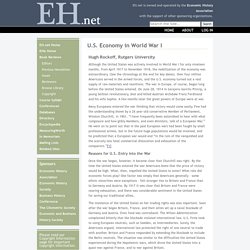
(See the chronology at the end for key dates). Over four million Americans served in the armed forces, and the U.S. economy turned out a vast supply of raw materials and munitions. The war in Europe, of course, began long before the United States entered. On June 28, 1914 in Sarajevo Gavrilo Princip, a young Serbian revolutionary, shot and killed Austrian Archduke Franz Ferdinand and his wife Sophie. Many Europeans entered the war thinking that victory would come easily. International Encyclopedia of the First World War (WW1) Introduction↑ Wars bring with them dramatically higher public expenditure and lower private consumption.
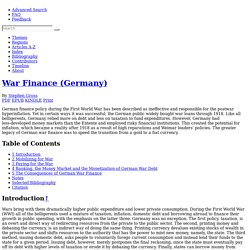
During the First World War (WWI) all of the belligerents used a mixture of taxation, inflation, domestic debt and borrowing abroad to finance their growth in public spending, with the emphasis on the latter three. Germany was no exception. The first policy, taxation, is an overt and direct way of redirecting resources from the private to the public sector. The second, printing money and debasing the currency, is an indirect way of doing the same thing. Contemporaries and scholars have tended to judge Germany’s wartime financial policies negatively. Indeed, Germany’s war finance resembled Great Britain's and France's insofar as all three countries relied much more heavily on debt and inflation than on taxation to fund government spending. To understand the techniques and the legacy of German war finance, this article first examines efforts to mobilize for war financially before 1914.
What are three factors that made World War I a total war? - Homework Help. We can define a total war as a war that involved everyone (or practically everyone) in a country.
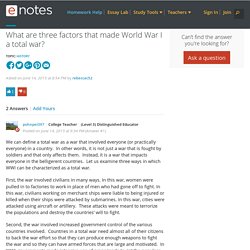
In other words, it is not just a war that is fought by soldiers and that only affects them. How was WW1 a total war? Total war is a military conflict in which nations mobilize all available resources in order to destroy another nation's ability to engage in war.
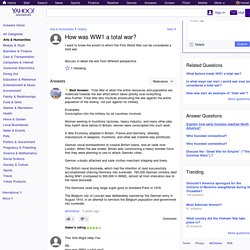
The practice of total war has been in use for centuries, but it was only in the middle to the end of 19th century that total war was identified as a separate class of warfare. There are several reasons of why Total War was recognized in the 19th century. The main reason is industrialization. As countries' natural and capital resources grew, it became clear that some forms of conflict demanded more resources than others. Additionally, this is the time when warfare was becoming more mechanized.
World War One gave birth to total war in the industrial age when huge armies of soldiers faced each other across battlefields that had been made horribly lethal by technological advances in weaponry. Young men were removed from production jobs, and were replaced by women. World War One: 10 interpretations of who started WW1. Image copyright Alamy As nations gear up to mark 100 years since the start of World War One, academic argument still rages over which country was to blame for the conflict.
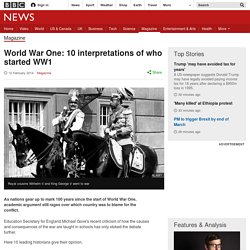
Education Secretary for England Michael Gove's recent criticism of how the causes and consequences of the war are taught in schools has only stoked the debate further. Here 10 leading historians give their opinion. Sir Max Hastings - military historian Germany No one nation deserves all responsibility for the outbreak of war, but Germany seems to me to deserve most. It alone had power to halt the descent to disaster at any time in July 1914 by withdrawing its "blank cheque" which offered support to Austria for its invasion of Serbia. I'm afraid I am unconvinced by the argument that Serbia was a rogue state which deserved its nemesis at Austria's hands. The question of whether Britain was obliged to join the European conflict which became inevitable by 1 August is almost a separate issue. Serbia Image copyright Getty Images. Rudbeck-IB-History-Revision - 2.2 Total War. Past Questions:Define “total war” and examine to what extent either the First World War or the Second World War was a “total war”.
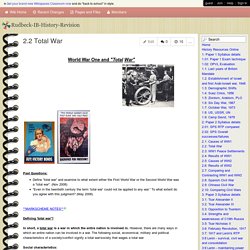
(Nov 2008)“Even in the twentieth century the term ‘total war’ could not be applied to any war.” To what extent do you agree with this judgment? (May 2008)**MARKSCHEME NOTES**Defining 'total war'? Views on Niall Ferguson's analysis of WW1 - Alternate History Discussion Board. 1) Eh?
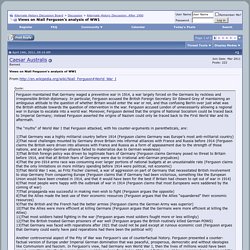
Weren't they a highly militarised country with a gigantic army and a large chunk of their men in the reserves? 2) Isn't this GCSE history? The ententes? 3) Nobody claims Germany was a direct threat to Britain. Germany however was a threat to the balance of power in Europe and long term that could threaten Britain. 4) No idea. 5) Very much doubt it as we see with the way Germany carved up Russia. 6) I doubt this, unless every other historian is wrong. 7) No idea. 8) Like how? Quote: